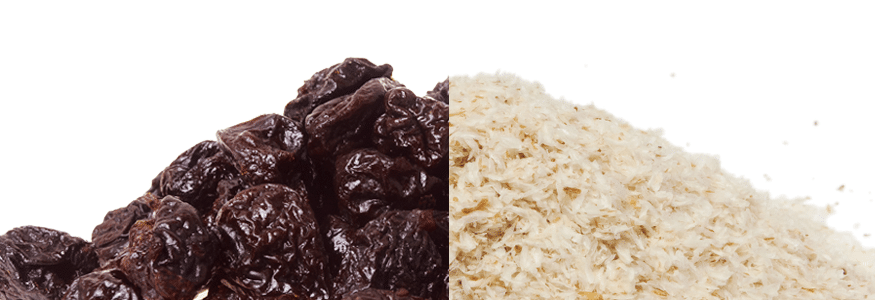
Prunes vs. Psyllium for Reducing Constipation
In a study, published in Alimentary Pharmacology and Therapeutics,1 researchers compared the effectiveness of a popular natural supplement, psyllium (Metamucil®), to a natural food remedy that humans have been consuming for thousands of years, dried plums (prunes). They concluded that prunes are superior in providing safe, effective relief of mild to moderate chronic constipation.
Chronic constipation is a frustrating condition, affecting up to 20% of the world’s population.1 Since only one third of constipation sufferers seek medical assistance, there is a substantial market for over-the-counter treatments, including fibre supplements, stool softeners, laxatives, and enemas.
Prune vs. Psyllium Study
For fourteen weeks, the researchers followed forty subjects, aged 18-75, whose symptoms met the Rome III criteria for chronic constipation, but not for irritable bowel syndrome (IBS). For the first week, the study participants used no laxatives or other constipation treatments. The researchers then randomly assigned half of the participants to start with a treatment of 11g of psyllium with 8oz of water, twice a day, and the other half to start with 50g of prunes (approximately 12 prunes) with meals, twice a day. Each treatment equalled 6g of fibre a day.
After three weeks, there was another one-week washout period before the groups switched and used the opposite treatment for three weeks. Throughout the first eight weeks of the study, participants completed a daily stool symptom diary. They then returned to their regular constipation remedies for six weeks, completing the daily symptom diary for only the final week of that period, before meeting with the researchers for a final follow-up visit.
The researchers’ primary measure was the number of complete spontaneous bowel movements (CSBMs) per week; they also analysed the number of incomplete and/or non-spontaneous bowel movements per week, global constipation symptoms scores, stool consistency, straining scores, satiety, postprandial fullness, abdominal bloating or distension, and palatability of the treatment (i.e., the taste!). The researchers found that, while both treatments provided constipation relief, the average number of CSBMs per week was significantly higher during treatment with prunes than with psyllium, with an average of 3.5 CSBMs with prunes and 2.8 CSBMs with psyllium. The researchers also note that the prune therapy resulted in softer stools, although straining scores were about the same with both treatments. The study participants found the remedies equally palatable and experienced no symptoms such as postprandial fullness or bloating with either treatment.
The researchers found that, while both treatments provided constipation relief, the average number of CSBMs per week was significantly higher during treatment with prunes than with psyllium, with an average of 3.5 CSBMs with prunes and 2.8 CSBMs with psyllium. The researchers also note that the prune therapy resulted in softer stools, although straining scores were about the same with both treatments. The study participants found the remedies equally palatable and experienced no symptoms such as postprandial fullness or bloating with either treatment.
Study Recommendations
The laxative mechanism of prunes is not yet fully known but researchers suspect it is likely related to the combination of sorbitol, water-soluble fibre, and polyphenols that they contain. Fibre is a bulking agent known to help with digestion, and sorbitol, which is often used to sweeten sugar-free foods, is known to act as an osmotic laxative, even without any fibre. Interestingly, some previous studies have shown sorbitol to cause gas and bloating, but subjects in this study did not report these side effects.
The researchers recommend prunes as a first-line treatment for mild to moderate constipation; however, they note that their study did not include patients with IBS, severe constipation, or pelvic floor dysfunction. In The Inside Tract®, Issue #177, we reported on a study that found polyethylene glycol to be a more effective osmotic laxative than lactulose for chronic constipation.
If you suffer from chronic constipation and are unsure of the right treatment for you, talk to your physician for a specific recommendation.
Do you enjoy prunes?
You’re in good company; Confucius was writing about his love of prunes back in 479BC. Pompey and Alexander the Great were also unabashed fans. Plums are still a big hit worldwide; they are the second most cultivated fruit (apples fill the number one spot).
Prunes: good for more than constipation relief
Prunes slow the rate at which food leaves the stomach, helping dieters feel full sooner and for longer periods. They’re also fat free and, even with their natural sugars, only a mere 11 calories each. Prunes contain good amounts of potassium and iron, and antioxidants, including lutein. With these nutrients, you could find benefit for your eyes, skin and hair, and even some help in the battle against osteoporosis.
Think you don’t like prunes?
Try substituting your favourite raisin dishes with prunes, such as baked goods, breakfast cereal, and any number of delicious sweet and savoury dishes.
Want to learn more about constipation?
We have several related articles that may be helpful:
- 5 Fun Facts About Fruit and the Gut
- Aging and the Digestive Tract Video
- Biofeedback Shows Promise for Chronic Constipation
- Call for Patient Perspectives – Constella® for Chronic Constipation
- Carbonated Water May Help Dyspepsia & Constipation
- Chronic Constipation Disrupts Daily Life
- Constella®
- Constipation
- Constipation and Diet
- Dietary Fibre
- Dietary Fibre Q & A
- Diverticular Disease
- Enemas
- Gastrointestinal Issues Associated with Obesity
- Hemorrhoids
- IBS Updates 2021
- Increase Dietary Fibre – Reduce Health Care Costs
- Irritable Bowel Syndrome (IBS)
- Multiple Sclerosis and the Gut
- Nutrition and the Aging Gut Video
- Pelvic Floor Dysfunction
- Physical Activity and GI Health
- Polyethelyne Glycol vs. Lactulose
- Prunes vs. Psyllium for Reducing Constipation
- Resotran®
- Serious Toll of Chronic Constipation Overlooked
- Talking to Your Physician about IBS and Constipation
- The Scoop on Poop
- Treating Constipation with Laxatives

